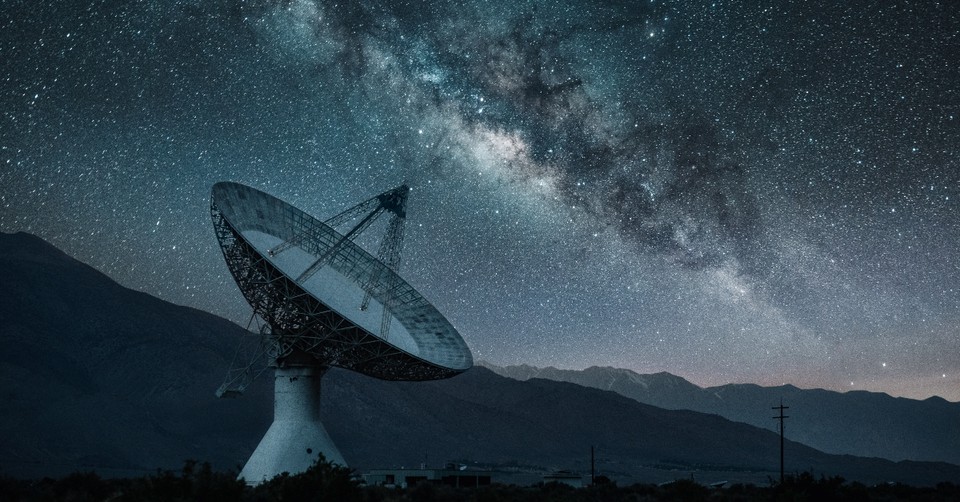Should Christians Entertain the Idea of Aliens?

A recent hearing within the House of Representatives has revealed that a former intelligence official, David Grusch, claims that the Pentagon has recovered crash vehicles as well as biological remains that were “non-human.”
Two other witnesses, both former Navy officers, testified that they too had personal experiences with UFOs (or UAPs). There was also a video from 2004 where they apparently caught a strange spacecraft on camera.
This, as you might expect, has led to more conversation about the possibility of other life forms on Earth. Is it possible that aliens exist? And if they do, how might impact faith?
Does the Bible mention aliens? Would Jesus be the Savior of aliens too? We’ll explore those questions today.
Does the Bible Ever Mention Aliens?
Before specifically answering this question about intelligent life on another planet, it might be helpful to change our question for just a moment. Does the Bible ever mention penguins? Does the Bible ever mention the kangaroo?
The answer is no. And yet this does not throw us into a tailspin of faith. To the people living in the time of the Bible, the world of Australia and Antarctica was foreign — just as Mars would be to us today. It’s only a matter of scale.
It may also help us to fill out what the term “alien” even means. Its most simple definition is one a person/thing that belongs or relates to another person, place, or thing. It’s a stranger.
Therefore, from the perspective of someone living in Jerusalem, a penguin is an alien bird, and a kangaroo is an alien marsupial. When we expand this to mean an alien to Earth, then it is simply a life-form that belongs to a realm other than Earth.
Given this definition, in one sense, we could say that angels and demons are “aliens” of sorts. Yet, I doubt this is what people mean when they talk about aliens. Most mean an intelligent life form coming from another planet.
And to this, the Bible is silent. For the most part, it is silent because the understanding at the time in which the scriptures were written was about as informed of other planets as they were penguins and kangaroos.
What the Bible does declare is that God is the creator of the entire universe (John 1:3), that the heavens declare the glory of God (Psalm 19:1), and that Christ is the redeemer of the entire universe (Colossians 1:15-23).
This begs the question: if we discovered aliens, how would they fit into a Christian worldview?
What Would it Mean if There Are Aliens?
Some are thrown by the idea of aliens on other planets because it's often connected with evolution. How’d they get there? Do they have their own creation story? And if they have their own creation story, do they have their own fall and redemption?
The first thing to consider is that aliens are not human. This is significant because the Bible proclaims that humanity has a unique relationship with God, having been created in His image. The creation of humanity is set apart from the creation of other aspects of creation — including other life forms.
Therefore, if aliens do exist, they exist in a manner similar to angels, demons, or cats (which I suppose might also fit in the demonic category). Answering this question, then, is similar to asking how a penguin, a kangaroo, or a cat relates to a Christian worldview.
What is the purpose of other life forms, like animals? We know that God created them (Genesis 1:24-25), and God cares for them (Matthew 10:29-31). We may also conclude that if aliens are part of creation, then, they are part of God’s works.
And from this, we can conclude with Psalm 104:31 that God delights in them. It also wouldn’t be a stretch to conclude from Psalm 148 that they, too, bring glory and praise to God.
We would need to be cautious, though, in extending some of the “ruling” and “reigning” language of Genesis 1 onto a being from another planet.
It seems pretty clear from Genesis 1 that even though God created everything, and that humanity is the pinnacle of this creation, the sphere of their co-regency is the Garden of Eden on Earth. To this end, aliens would probably fit a little closer to angels than to animals.
This leads to what might be the most pressing issue in regard to aliens within a Christian worldview, namely, their redemption. Are aliens redeemed? Are they redeemable? Would Jesus be the Savior of aliens too?
Would Jesus Be the Savior of Aliens Too?
Jesus Christ came in the flesh, to the earth, to redeem humanity. As Scripture declares, he took on flesh in order to redeem people. Hebrews 2:14-17 shows that Jesus’ salvific work is explicitly for those who are “flesh and blood.”
The author of Hebrews even explicitly states, “It is not angels that he helps.” What does this mean for aliens and salvation? There are four main answers to this question.
1. Aliens do not need redemption.
2. Aliens need redemption, but God provides it specifically for them.
3. Aliens need redemption, and it is provided through Christ’s earthly sacrifice.
4. Aliens need redemption, and the sacrifice of Christ is reenacted in their own world.
The fourth option is the least plausible as Hebrews 9:27-28, 10:10 seems to indicate that the sacrifice of Christ was a once for “all” act.
I suppose one could argue that this is humanly speaking and that the “all” would refer to all of humanity but not necessarily other life forms. While that could be an option, it doesn’t seem likely.
There is nothing in Scripture that would lead us to believe that Christ is reenacting the same sacrifice in other worlds.
The first option, though one which C.S. Lewis might have held, also does not seem to entirely jive with Scripture. His work, Perelandra, is an interesting exploration of this topic.
And he hypothesizes that perhaps Jesus left the 99 in order to reach the one — humanity is the one. Therefore, there are 99 others that are not in need of redemption. While certainly creative, this seems to push the text much further than its intention.
In contrast to Lewis’ argument is the reality that all of creation needs to be redeemed. Yes, it’s possible that because of their position (being more like angelic or animalia), the concept of sin would be entirely different.
Nobody is arguing that your dog Fido has original sin and is under the wrath of God for relieving himself in the neighbor’s yard.
But Scripture does speak of creation groaning (Romans 8:20-22) under the weight of the curse and of the need for Christ to be a cosmic reconciler (Colossians 1:15-22). Therefore, we conclude that, at least in some sense, aliens are in need of redemption.
The second and third options are very similar. The second option would be something similar to how God relates to angels. It’s clear that the Gospel of Christ has at least some bearing upon them, but also that they marvel at things like grace (1 Peter 1:12).
And it also seems as if God does not provide redemption for fallen angels. One might argue that something similar would be the case with aliens — they have a unique position within God’s economy of salvation that is entirely different from that of humanity.
This certainly makes logical sense, but it's entirely conjecture. Scripture speaks to God’s redemption of humanity, and it’s silent on issues such as this one.
However, there is some scriptural basis for believing the third option. The life, death, burial, and resurrection of Jesus Christ have cosmic implications. He is reconciling all things to Himself. He is enacting a new creation.
Yes, redemption is accomplished here on this pale blue dot, but that does not mean that it doesn’t have an impact on other planets. Colossians 1 paints a picture of the cosmic scope of Christ’s redemption.
Why Does This Matter?
If aliens do exist, it shouldn’t cause a crisis of faith for any believer. As mentioned earlier, in one sense, it’s no different than discovering a new creature in the rainforest.
And yet there are some unique questions and complexities to intelligent life being found on another planet. Even still, aliens could easily fit into a biblical worldview.
Does this make impossible the existence of life elsewhere in the universe? I appreciate the answer of Albert Mohler on this question:
“The answer is no; that’s speculative. What it does make very clear is that the entire cosmos was created for the drama of redemption, as Calvin said. The cosmos is a theater of God’s redemption, of what would take place here in order to save sinful humanity.
We have no reason to believe there is any other story out there. There is nothing in Scripture that says there can’t be some form of life somewhere. But what we are told is that the cosmos was created in order that on this planet Jesus Christ, in space and time and history, would come to save sinful humanity.”
In other words, the Christian faith is centered on what Jesus Christ has done to redeem sinful humanity. Can aliens fit into this picture? Sure. But it’s entirely speculative at this point.
Related podcast:
For further reading:
What Happened on the 7 Days of Creation?
How Should Christians Respond to Claims of Alien Life?
Why Does it Have to Be Creation or Evolution?
Photo Credit: ©iStock/Getty Images Plus/ferrantraite
Mike Leake is husband to Nikki and father to Isaiah and Hannah. He is also the lead pastor at Calvary of Neosho, MO. Mike is the author of Torn to Heal and Jesus Is All You Need. His writing home is https://mikeleake.net and you can connect with him on Twitter @mikeleake. Mike has a new writing project at Proverbs4Today.

Originally published August 11, 2023.




